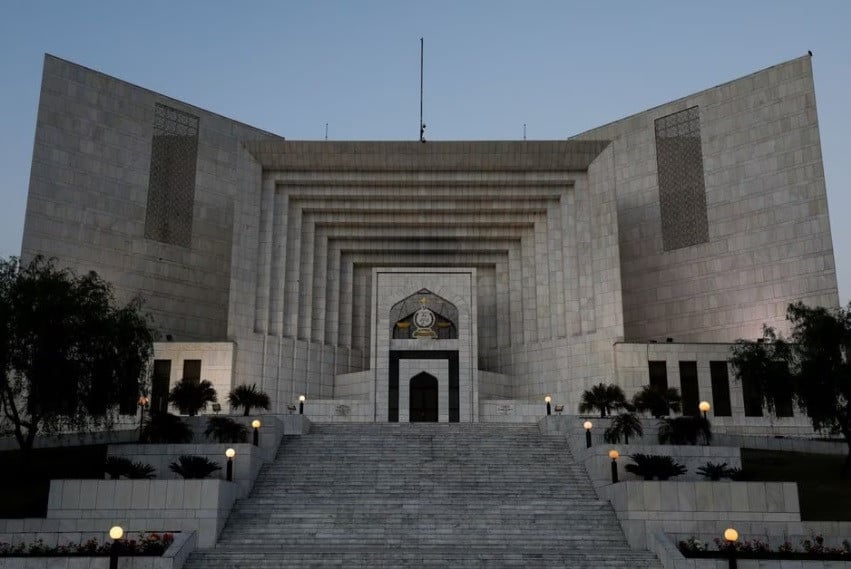
The authorities have failed to implement the Supreme Court’s order for holding polls in Punjab on May 14. However, some experts believe formation of a full court or a nine-judge larger bench is still a viable option to end the crisis that has pitted state institutions against one another.
A three-judge bench led by Chief Justice of Pakistan (CJP) Umar Ata Bandial and comprising Justice Ijazul Ahsan and Justice Munib Akhtar will on Monday (today) take up a review petition filed by the Election Commission of Pakistan (ECP) against the court’s April 4 order.
The PDM-led government has already raised several objections to this bench which on April 4 set aside the ECP’s notification to postpone polls in Punjab and ordered the polls supervisory authority to hold elections for the provincial legislature on May 14.
The government contends that the suo motu case about election date has already been dismissed by a vote of 4 to 3 but the three-judge bench has rejected this contention, declaring that the suo motu was upheld by a vote of 3 to 2.
Two SC judges — Justice Ijazul Ahsan and Justice Sayyed Mazahar Ali Akbar Naqvi — on February 16 requested CJP Bandial to take suo motu notice of delay in announcement of polls in Punjab.
Subsequently, the CJP started suo motu proceedings by forming a nine-judge bench to hear the matter.
The CJP then reconstituted a five-judge bench, which on March 1 issued a split 3-2 verdict, empowering President Arif Alvi to announce the date of the Punjab elections, while directing the K-P governor to set the polls date for the provincial assembly in consultation with the ECP.
Two judges, who were part of the 9-judge bench – Justice Athar Minallah and Justice Yahya Afridi – had, however, raised objections to maintainability of the petitions.
Lawyers are also divided as to which order is applicable. The CJP, who is the final authority in the SC, has held that 3 to 2 order is valid. In order to keep this controversy alive, the federal government did not challenge the SC’s April 4 order. Now this argument is part of the narrative built by the ruling alliance.
Read SC to resume hearing polls case today
Some senior lawyers believe that in order to end the debate on the legality of orders, CJP Bandial should constitute a full court or a nine-judge larger bench to decide the legal question about holding elections once and for all. Even the ECP review petition can be listed before the full court or a larger bench.
If the united court issues a judgment then the coalition government will have no choice but to comply with it, they add. Pakistan Bar Council (PBC) representative in the Judicial Commission of Pakistan (JCP) Akhtar Hussian also believes that a full court may still resolve the ongoing controversy on elections.
He also disapproved of the PDM parties’ decision to hold a protest in front of the Supreme Court.
However, Hussain said the SC itself is responsible for this prevailing situation as one part of society is expressing no confidence in the court proceedings. In order to restore confidence of all political parties in the court, CJP Bandial should form a full court to hear the case, he added
He expressed serious reservation about the SC's order for suspending the Supreme Court (Practice and Procedure) Act, 2023, adding that parliament had passed the new law on lawyers' demand. He lamented that despite the bar’s demand, SC did not amend rules to regulate discretionary powers of the CJP.
Hussain also alleged that independence of judiciary was compromised by violating the seniority principle in elevation of high court judges to the SC. However, another lawyer said now all stakeholders have very limited options. Even full court is also not a viable option now, he said.
It is learnt that CJP Bandial has taken steps to evolve consensus on appointment of judges.
Sources revealed to The Express Tribune that a meeting of senior SC judges was held to discuss nominations for the post of the Federal Shariat Court chief justice.
The meeting took place in a pleasant atmosphere which is a positive development in the prevailing situation as there is a perception that the SC has divided into two camps.
They said senior SC judges have agreed on the nomination of retired SC judge Iqbal Hameedur Rehman as the chief justice of the Federal Shariat Court. The JCP meeting will be held today [Monday] to consider his nomination.
It is witnessed that inclusion of Justice Athar Minallah in a three-judge special bench formed to hear the Pakistan Tehreek-e-Insaf’s (PTI) petition against arrest of party chief Imran Khan from the premises of the Islamabad High Court (IHC) on May 9 has also had profound implications.
The IHC judges have also seen the arrest of former prime minister Imran from within the high court premises as undue interference of powerful circles in the administration of justice. Some experts believe that a united judiciary can stand up against other forces.
Read morePDM stands firm on SC protest despite govt plea for relocation
A senior lawyer said powerful circles should take care while dealing with judges. “They should also learn a lesson from the Iftikhar Chaudhry episode when the entire judiciary united after the former CJP was mistreated,” he said.
He said CJP Bandial should also take some steps to resolve the election issue through political dialogue.
“If the election issue is resolved through dialogue then political stability will be restored. However, if elections are held without settling the rules of games then there will be no political stability in the country and opposition parties will take to the streets.
“Currently, Imran Khan does not want dialogue with political parties. He is targeting everyone including the establishment because he is getting support from the judiciary in the prevailing situation.”
A government official believes that things have reached a point where all stakeholders have little options. They all should show flexibility in their stances for the betterment of the country, he said.



1731329418-0/BeFunky-collage-(39)1731329418-0-165x106.webp)



1731771315-0/images-(3)1731771315-0-270x192.webp)










COMMENTS (2)
Comments are moderated and generally will be posted if they are on-topic and not abusive.
For more information, please see our Comments FAQ